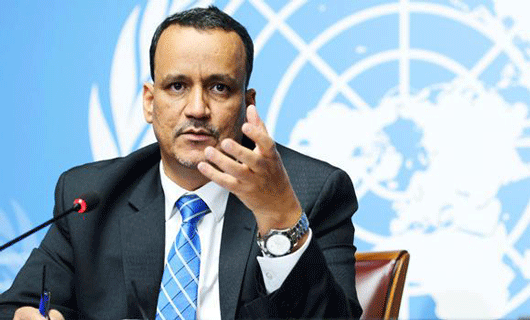
The warring parties in Yemen have agreed to a cease-fire at midnight on April 10 ahead of a new round of peace talks starting April 18 in Kuwait, the U.N. envoy to Yemen announced Wednesday.
Ismail Ould Cheikh Ahmed made the announcement following extensive consultations with Yemen’s exiked government and Houthi Ansarullah movement as well as regional countries, the United States and France.
Previous attempts to implement a cease-fire in Yemen have failed to take hold on the ground, with each side accusing the other of immediately violating the terms. A first round of talks was held in Switzerland in December.
Cheikh Ahmed said he is "more optimistic" about the upcoming talks because they have the support of all parties who have underlined the importance of finding a political solution as soon as possible to end "the extremely high level of humanitarian suffering."
"The war in Yemen must be brought to an end, and before it does irreparable damage to the future of Yemen and to the region," he said. "If we fail this time, it’s probably one of our last chances to get an end to this war."
Cheikh Ahmed said the Yemeni people have suffered "an unspeakable tragedy," calling the civilian casualties "an affront to humanity."
The U.N. envoy said the talks, which he will lead, aim to reach an agreement to end the conflict and allow the resumption of political dialogue leading to a peaceful transition based on a regional peace initiative, a national dialogue and U.N. Security Council resolutions.
He said the parties have committed to reinforcing a committee overseeing the cease-fire with prominent Yemeni figures who will report on progress and security incidents.
The Yemeni talks will focus on five areas: the withdrawal of militia and armed groups, the handover of heavy weaponry to the state, interim security arrangements, restoration of state institutions and resumption of an inclusive political dialogue, he said. A special committee will be created to deal with prisoners and detainees.
Cheikh Ahmed said the cessation of hostilities must also seek to ensure "safe, rapid and unhindered" humanitarian access everywhere in the country as well as an increase in commercial shipments in the coming weeks. These are crucial because Yemen imports almost all its food.
Cheikh Ahmed said he has also pursued agreements that would preserve the functioning of the state bank and other state institutions during the cease-fire.
Source: News Agencies, Edited by Website Team